- Financial Performance – A Complete Tutorial
- How Six Sigma Principles Can Progress Your Productivity – Tutorial
- Google Analytics Pro Tutorial | Fast Track your Career
- Activity-Based Costing Tutorial | Know about Definition, Process, & Example
- Create a workbook in Excel Tutorial | Learn in 1 Day
- Excel ROUNDUP Formula Tutorial | Learn with Functions & Examples
- Business Analytics with Excel Tutorial | Learn In 1 Day
- SAP Tutorial – Free Guide Tutorial & REAL-TIME Examples
- IBM SPSS Statistics Tutorial: Getting Started with SPSS
- SAP Security Tutorial | Basics & Definition for Beginners
- SAP Simple Finance Tutorial | Ultimate Guide to Learn [Updated]
- SAP FIORI Tutorial | Learn in 1 Day FREE
- Introduction to Business Analytics with R Tutorial | Ultimate Guide to Learn
- Tableau Desktop Tutorial | Step by Step resource guide to learn Tableau
- Implementing SAP BW on SAP HANA | A Complete Guide
- SAP HANA Administration | Free Guide Tutorial & REAL-TIME Examples
- Tableau API Tutorial | Get Started with Tools, REST Basics
- SAP FICO ( Financial Accounting and Controlling ) Tutorial | Complete Guide
- Alteryx Tutorial | Step by Step Guide for Beginners
- Getting started with Amazon Athena Tutorial – Serverless Interactive | The Ultimate Guide
- Introduction to Looker Tutorial – A Complete Guide for Beginners
- Sitecore Tutorials | For Beginners Learn in 1 Day FREE |Ultimate Guide to Learn [UPDATED]
- Adobe Analytics Tutorial – The Ultimate Student Guide
- Splunk For Beginners – Learn Everything About Splunk with Free Online Tutorial
- An Overview of SAP HANA Tutorial: Learn in 1 Day FREE
- Statistical Package for the Social Sciences – SPSS Tutorial: The Ultimate Guide
- Splunk For Beginners – Learn Everything About Splunk with Free Online Tutorial
- Pentaho Tutorial – Best Resources To Learn in 1 Day | CHECK OUT
- Statistical Package for the Social Sciences – SPSS Tutorial: The Ultimate Guide
- An Overview of SAP HANA Tutorial: Learn in 1 Day FREE
- Spotfire Tutorial for Beginners | Quickstart – MUST- READ
- JasperReports Tutorial: Ultimate Guide to Learn [BEST & NEW]
- Charts and Tables – Qlikview Tutorial – Complete Guide
- TIBCO Business Works | Tutorial for Beginners – Learn From Home
- Cognos TM1 Tutorial : Learn Cognos from Experts
- Kibana
- Power BI Desktop Tutorial
- Tableau Tutorial
- SSAS Tutorial
- Creating Tableau Dashboards
- MDX Tutorial
- Tableau Cheat Sheet
- Analytics Tutorial
- Lean Maturity Matrix Tutorial
- MS Excel Tutorial
- Business Analysis Certification Levels & Their Requirements Tutorial
- Solution Assessment and Validation Tutorial
- Lean Six Sigma Tutorial
- Enterprise Analysis Tutorial
- Create Charts and Objects in Excel 2013 Tutorial
- Msbi Tutorial
- MicroStrategy Tutorial
- Advanced SAS Tutorial
- OBIEE Tutorial
- Tableau Server Tutorial
- OBIA Tutorial
- Business Analyst Tutorial
- Cognos Tutorial
- Qlik Sense Tutorial
- SAP-Bussiness Objects Tutorial
- SAS Tutorial
- PowerApps Tutorial
- Financial Performance – A Complete Tutorial
- How Six Sigma Principles Can Progress Your Productivity – Tutorial
- Google Analytics Pro Tutorial | Fast Track your Career
- Activity-Based Costing Tutorial | Know about Definition, Process, & Example
- Create a workbook in Excel Tutorial | Learn in 1 Day
- Excel ROUNDUP Formula Tutorial | Learn with Functions & Examples
- Business Analytics with Excel Tutorial | Learn In 1 Day
- SAP Tutorial – Free Guide Tutorial & REAL-TIME Examples
- IBM SPSS Statistics Tutorial: Getting Started with SPSS
- SAP Security Tutorial | Basics & Definition for Beginners
- SAP Simple Finance Tutorial | Ultimate Guide to Learn [Updated]
- SAP FIORI Tutorial | Learn in 1 Day FREE
- Introduction to Business Analytics with R Tutorial | Ultimate Guide to Learn
- Tableau Desktop Tutorial | Step by Step resource guide to learn Tableau
- Implementing SAP BW on SAP HANA | A Complete Guide
- SAP HANA Administration | Free Guide Tutorial & REAL-TIME Examples
- Tableau API Tutorial | Get Started with Tools, REST Basics
- SAP FICO ( Financial Accounting and Controlling ) Tutorial | Complete Guide
- Alteryx Tutorial | Step by Step Guide for Beginners
- Getting started with Amazon Athena Tutorial – Serverless Interactive | The Ultimate Guide
- Introduction to Looker Tutorial – A Complete Guide for Beginners
- Sitecore Tutorials | For Beginners Learn in 1 Day FREE |Ultimate Guide to Learn [UPDATED]
- Adobe Analytics Tutorial – The Ultimate Student Guide
- Splunk For Beginners – Learn Everything About Splunk with Free Online Tutorial
- An Overview of SAP HANA Tutorial: Learn in 1 Day FREE
- Statistical Package for the Social Sciences – SPSS Tutorial: The Ultimate Guide
- Splunk For Beginners – Learn Everything About Splunk with Free Online Tutorial
- Pentaho Tutorial – Best Resources To Learn in 1 Day | CHECK OUT
- Statistical Package for the Social Sciences – SPSS Tutorial: The Ultimate Guide
- An Overview of SAP HANA Tutorial: Learn in 1 Day FREE
- Spotfire Tutorial for Beginners | Quickstart – MUST- READ
- JasperReports Tutorial: Ultimate Guide to Learn [BEST & NEW]
- Charts and Tables – Qlikview Tutorial – Complete Guide
- TIBCO Business Works | Tutorial for Beginners – Learn From Home
- Cognos TM1 Tutorial : Learn Cognos from Experts
- Kibana
- Power BI Desktop Tutorial
- Tableau Tutorial
- SSAS Tutorial
- Creating Tableau Dashboards
- MDX Tutorial
- Tableau Cheat Sheet
- Analytics Tutorial
- Lean Maturity Matrix Tutorial
- MS Excel Tutorial
- Business Analysis Certification Levels & Their Requirements Tutorial
- Solution Assessment and Validation Tutorial
- Lean Six Sigma Tutorial
- Enterprise Analysis Tutorial
- Create Charts and Objects in Excel 2013 Tutorial
- Msbi Tutorial
- MicroStrategy Tutorial
- Advanced SAS Tutorial
- OBIEE Tutorial
- Tableau Server Tutorial
- OBIA Tutorial
- Business Analyst Tutorial
- Cognos Tutorial
- Qlik Sense Tutorial
- SAP-Bussiness Objects Tutorial
- SAS Tutorial
- PowerApps Tutorial

Business Analyst Tutorial
Last updated on 27th Sep 2020, Blog, Business Analytics, Tutorials
A Business Analyst is a person who analyses an organization, designs processes and systems, assesses the business models so that it can be integrated with technology.
Many times their role is not fully understood. Business analysts are the agents of change, as they introduce, manage, and facilitate the necessary changes to your business model.
They also serve as a communication channel between the sponsors, stakeholders and the project team.
What Is Business Analysis?
According to IIBA(International Institute of Business Analysis ): Business Analysis is “The practice of enabling change in an organizational context, by defining needs and recommending solutions that deliver value to stakeholders.”
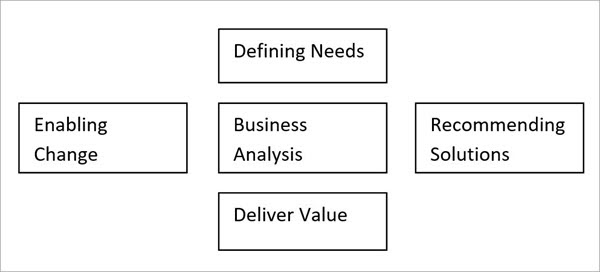
Let’s understand the above important keywords for business analysis:
- 1.Enabling Change: This is the key role of a business analyst. Helping organizations in changes could be related to new technologies, new systems, improve the existing process/system.
- 2.Defining needs: Someone determines the need, the business analyst defines that need in detail and the organization addresses that need.
- 3.Recommending solutions: Solutions may include: systems, processes, policies, and training.
- 4.Deliver value to stakeholders: Anyone impacted by our work. Management, other departments, regulators, partnering businesses, customers, etc, so attention should be on delivering value to all the stakeholders.
Who Is A Business Analyst?
According to IIBA (International Institute of Business Analysis): Business Analyst is “A Liaison among stakeholders in order to understand the structure, policies, and operations of an organization and to recommend solutions that enable the organization to achieve its goals”
In other words, a Business Analyst can be defined as a bridge between business and technology.
Responsibilities Of A BA
Requirements form the heart of any project and capturing them is very vital as they are the changes that enable the businesses to move to the next level.
The responsibility of capturing the right requirements for business changes lies with the Business Analysts. Thus BAs are a valuable asset to the organization.
The major task of a Business analyst is to deal with requirements which can be further categorized into two parts:
| Interaction with Customer | Interaction with Techinical Team |
| Gathering requirements | Requirement Communication |
| Documenting requirements | Clarifications |
| Modelling requirements | |
| Eliciting requirements | |
| Analyzing requirements | |
| Change Requests | |
| Functional Testing | |
| UAT co-ordination |
Now the question arises in mind what is a requirement and why it is important for a BA?
According to the Guide to the Business Analysis Body of Knowledge (BABOK), “A requirement is a usable representation of a need. Requirements focus on understanding what kind of value could be delivered if a requirement is fulfilled. The nature of the representation may be a document (or set of documents), but can vary widely depending on the circumstances.”
Here are a few important points that need to be focused with respect to requirements:
- 1.Requirements are documentation. Requirements can be Word docs, PowerPoints, Prototypes, mock-ups, Flowcharts.
- 2.Requirements provide the change roadmap i.e. requirements help us to compare the Current state Vs. Future State.
- 3.Requirements need to be easy to understand, clear, well structured, straightforward to implement, straightforward to test.
As business analysts, it’s our responsibility to understand the requirement clearly and maximize the value in our solution.
Listed below are some of the major responsibilities of a business analyst-
#1) Communication And Collaboration
Business Analysts drive effective collaboration across the organization. Communication plays a prominent role to achieve collaboration. A significant portion of project spending is wasted on rework caused by errors in requirements.
BAs play a vital role here as they are the ones who gather the requirements from the stakeholders. Having a right BA would reduce the costs incurred by the misunderstanding of the requirements.
As Business Analysts, they understand their spectrum of stakeholders spans across the whole organization right from the business owners, IT depts, Tech leads, QA and Users. Accordingly, they structure their communication channels responsibly by communicating the right information to the right people thereby achieving their objectives.
Setting up a friendly environment for connecting varied people and teams together is one of the primary roles for enabling seamless communication.
Facilitating working meetings by asking the right questions with stakeholders to understand the project needs, being a good listener to listen to the answers clearly and absorb what’s being said, communicate the appropriate information down to the IT teams are all a part of their jobs.
Being a strong communicator via digital means such as coreference calls and web meetings is also an important skill for a BA.
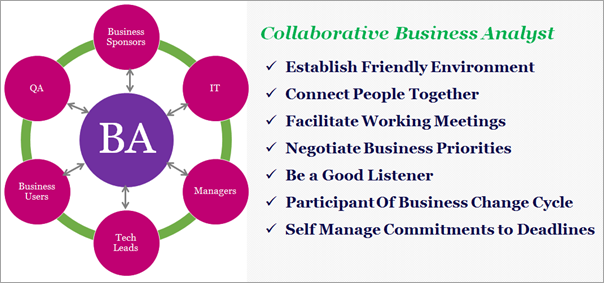
The teams or stakeholders involved have different objectives within themselves.
Subscribe For Free Demo
Error: Contact form not found.
For Example, the project team’s objective would be to deliver the project on time, QA team’s objective is to ensure that all the defects are identified and fixed while the Business team’s objective is to ensure that the product is fit for purpose. Thus, internal teams have varying objectives even though the vision of the project does not change.
It would be the role of the BA to bring together these teams with varied objectives and direct them towards the vision of the project. This involves negotiating and setting up business priorities within the team whenever required.
In the whole lifecycle of the business change, they are privileged to be an active participant and a good team player, by managing self-commitments and deliverables all the while.
#2) Processes And Tools
Structured and well-formatted processes all along with the requirements gathering, scoping and prioritization by the business analysts are absolutely necessary for achieving the business program objectives.
As elicitation of requirements is the first step towards scoping and as it determines the way forward for the project, BAs perform focussed analysis using various techniques such as brainstorming, interviews, and workshops.
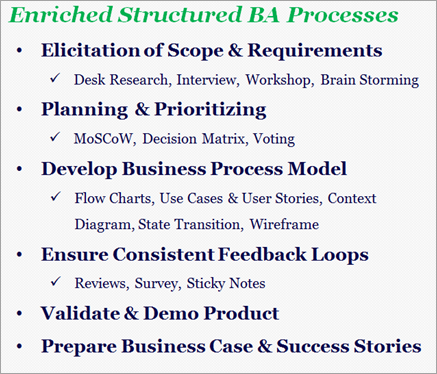
Business Analysts then develop the Business Process models in the form of wireframes, flow charts, state transition diagrams, use cases, Visio diagrams, etc., in such a way that all the teams who are consuming this information, are able to interpret the flows and interactions appropriately.
Any activity would not be complete without relevant reviews. Thus BAs include constant feedback loops in every process to ensure that there are no gaps in achieving the business objectives.
Once the program is progressed, they involve themselves in doing a simple validation and then demoing the product to the relevant stakeholders at appropriate times, to ensure that there are no gaps. Also, they take pride in preparing business case studies and success stories so that the learnings would be helpful for the subsequent programs.
#3) Leveraging Knowledge
With the growing business needs, it is very essential to leverage their own skills and experience to the best possible, thereby bringing more value to the organization. Business Analysts naturally have strong analytical skills. Due to their strong and adaptive nature, they grasp the domain knowledge more easily and become SMEs.
Having good domain knowledge enables them to understand the requirements from the stakeholders and they would be able to relate them back to the program objectives easily.
Moreover, their knowledge allows them to perform risk assessments for the multiple options presented to them both from a technical and business perspective. Subsequently, driving the right balance in merging the business and technology would be possible for them and they help by recommending the right solutions.
Recommending solutions and facilitating the business change with the IT teams is just one part of the story. With a precise understanding of the project and the program objectives, they can rightly correlate the project for the end to end business processes.
This selects them to be the best person for educating the users on the usage of the project for their business objectives thereby supporting them with business process assurance.
How to start your career as a Business Analyst
Are you exploring a different, exciting and challenging career option in the IT industry?
Or are you a testing professional who further wishes to unleash your passion for analytical problem solving and build deep business experience and technical experience? Or Are you looking out for a rewarding and lucrative career?
Then, here is the career avenue for you – Business Analysis.
Business analysis has already gained momentum in the professional scenario. There is a strong future prospect for this career. Business analysis is a growth market. Business analysts ensure the businesses to invest their resources of manpower and money more wisely. Also, the growth roadmap for this career is very promising.
Last but not the least, if you love traveling around the globe, a career in business analysis is an apt one for you. This profile demands a lot of traveling both short terms as well as long-term based on the project requirements. BA’s are supposed to visit their customers to elicitate the requirements.
A multinational IT firm with customers spread globally can really give a good exposure to a BA.
Who is a Business Analyst?
As the name itself suggests, ‘Business Analyst’ or BA analyses the business in order to help to build the software which can help the business grow rapidly, become more efficient, organized and hence, more successful.
Business Analyst’s role is important in the IT industry today. In fact, a BA is a must in a team where the business requirements are to be understood and elicitated. A business analyst bridges the understanding gap between the business operations and software technology to elicitate the requirements and help to build the software.
What does a Business Analyst Entail?
What does a BA actually do? BA is the face of a Software Company when it comes to meeting the customers to collate the requirements for the desired software. He or she understands the requirements of the client (or business) and then translates them into a language that is easily understood by the technical (development) team and gets the software developed.
BA who would be liaising with the business team and software firm’s technical team needs to have a thorough knowledge of the processes in the business. He would then map them to the core software available and then identify gaps if any. He would also provide a solution to the gaps identified and ensure to build the required software for the customer.
For Example, a PQRS bank wants to buy loan management software from a software firm. The business analyst who would be liaising with the bank team and the software firm’s technical team needs to have a thorough knowledge of loan management process in the banking industry.
BA would elicitate the requirements from the bank regarding their loan management process. He would then map them to the software and then identify the gaps if any. He would also provide a solution to the gaps identified and ensures building the required software for the client or bank.
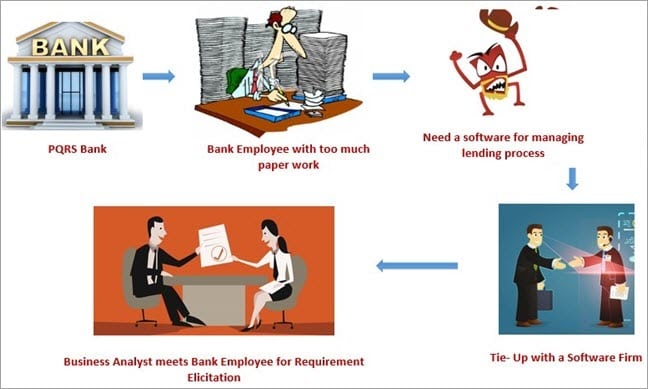
BA is required to have technical flair so that he is able to translate the business requirements for a better understanding of the technical team who would actually develop the software. And this is where being an engineer or a tester gives an added advantage.
A BA with engineering (technical) background or a testing background can really relate well to the technical team.
Responsibilities of a BA
The key responsibility of a business analyst is to collate, understand, analyze and document the customer’s software requirements. He has to thoroughly analyze the software requirements from the business perspective.
There are a wide array of activities for a BA to perform which may vary from one organization to another organization. A BA works with the business to help them improvise their operation and processes. He communicates with various stakeholders to identify the problems and needs.
Some of the key responsibilities of a BA include:
- Requirement Elicitation and Analysis (Primary KRA).
- Documentation of requirements and various artifacts (Primary KRA).
- Conducting Training for external as well internal customers.
- Functional Testing.
- Closely working with the development team in making them understand the requirements and build the product (Primary KRA).
- Pre Sales Activities (Support to Business Development Team).
BA has a tremendous demand in the IT industry which makes it a lucrative career option. And, as already mentioned, a BA who has already worked in the business before has an edge over others.
How to go about Becoming a BA?
You can become a BA via the MBA route or via the Testing or Coding route as mentioned below.In today’s scenario, Software development (IT) companies are catering to many domains. The domain is the business for whom the companies are building the software products or providing services. There were companies building software for the manufacturing firms, for networking, banking & financial institutions, healthcare industry and so on.
If banking & finance domain fascinates you then you may opt to specialize in finance during MBA. If manufacturing and operations domain excites you then you may go for MBA in Operations. Pursuing the right stream of specializing in MBA helps you to enter the correct domain in the IT industry.
BA can become successful only if he or she has actually worked in the business.
For Example, BA who has actually worked in a bank would be successful in his career in an IT firm for building software for banks.
However, it is not compulsory to work in business before getting into IT as a Business Analyst. But, a BA with an experience in the business always has an added advantage. With years of experience in a particular domain, you could choose to become a Subject Matter Expert (SME).
MBA degree from a reputed institution is also important. You can become a BA without engineering or equivalent technical degree (MCA etc…) but MBA degree has an added advantage to aspire for a BA role in good and reputed IT companies.
MBA plays a vital role in developing the skills which are essential for becoming a successful Business Analyst like the ability to gain business insights, communication skills, gaining domain expertise and management skills. Business Analyst has to engage with various stakeholders, customers, and developers. MBA helps him to manage time and people.
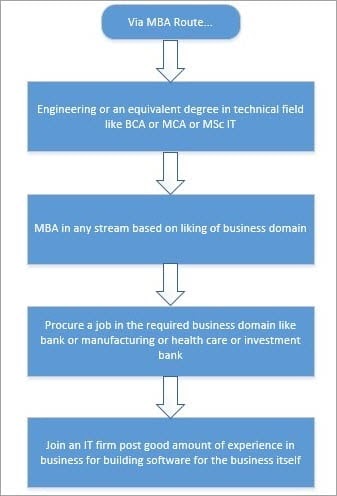
Via Testing or Coding route
A skilled workmanship can never remain hidden and it tends to get identified in the crowd. There is a huge scope for a programmer or a tester to enter into the business analysis. An excellent coder or an excellent tester are high on analytical skills and tend to develop the good hold on the business with experience on the related software.
Technical resources with decades of experience in the same business domain understand the business in and out and may be better than the newly hired BA’s from top management schools.
The technical background will help us to give better solutions to the gaps identified in the requirement analysis phase as the outlook of a tester and coder is different from a non-technical resource. Solutions designed by technical resources are simpler and full proof. They are better at getting the software developed and tested as they can relate well with the team.
However, for a career in BA, testing professionals or programmers need to be sure about acquiring the below skill set and qualification.
Communication Skills
Excellent oral and written communication skills with a very good command of English Language is a must. This is highly crucial as BA’s main responsibility is communicating with various stakeholders for collating the requirements and then getting them built into a software.
Any gap in communication can lead to incorrect requirement elicitation and hence a wrong software product won’t meet the end requirements.
Those who lack this skill can improve slowly and steadily by assisting a BA in his or her written assignments, reading the documents minutely by communicating in the English language. English speaking courses may be considered for polishing the skills. This is difficult and may take some time but it is not impossible. This is a hurdle worth overcoming for the talented souls.
I have met many experienced testers and developers with high analytical skills who had only communication issues while aspiring for a BA role.
Management Degree
MBA or an equivalent degree makes a difference and there is no doubt about it.
A management degree from a good and reputed institution gives a total 360-degree change in your personality. The course is designed in such a way that it takes out the smarter person in you, develops managerial skills in you and develops your personality to a great extent by making you confident.
MBA is also responsible for enhancing communication skills to a certain extent as the subjects, assignments, and tests tend to improve communication skills. An MBA degree increases the chances of procuring management roles in career and higher salaries.
A tester or developer can pursue a full-time MBA course as it gives an added advantage. However, they can also do a part-time MBA. In either of the cases, it’s mandatory to get the degree from a reputed institution as an MBA degree with less or no development in your personality is less helpful in the long run.
In several top and reputed IT organizations, MBA or equivalent degree is mandatory for Business Analyst role.
Salary brackets are also different for MBA and non-MBA candidates who apply for the BA role. Thus, apart from personality development and enhancement of communication skills, MBA promises growth in terms of both compensation and grades.
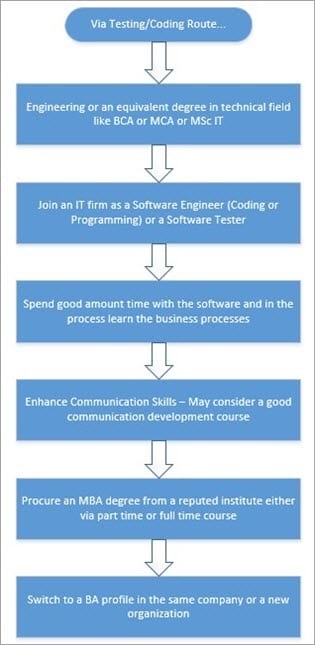
I strongly believe that a person with technical background has more scope to become a successful business analyst as they have the technical skills which make life easy ahead. Coding or testing skills are tremendously helpful in getting the software built in the right way as they are aware of the shortcomings and loopholes of technology or programming.
BA with technical background always provides a better solution to the requirements. Lack of technical insights is a major problem of today’s BA who have never done coding or testing before.
What’s next in Moving up the ladder?
After several years of experience in the industry, they reach a pivotal point from where they can take the next step in their career.
Business Analyst can grow in their professional paths to become Lead/Senior Business Analyst, Consultants, Product Owners or Product Managers. These are some of the cream profiles in IT world today. They are very challenging and satisfying roles too.
With time and experience, Business Analyst can help the software development companies to create world-class feature-rich products and services. BA’s who want to enhance their expertise and expand their career options should go for industry-recognized certifications.
IIBA (International Institute of Business Analysis) offers prestigious CBAP (Certified Business Analysis Professional) accreditation. This certification may prove to be one of the most important steps in the career as they help in boosting the salary by almost 16% (*Source – Certification Magazine).
The IIBA identifies the core competencies, called as ‘underlying competencies’ in the Business Analysis Body of Knowledge (BABoK).
Core Competencies include:
- Analytical Thinking and Problem Solving
- Behavioral Characteristics
- Business Knowledge
- Communication Skills
- Interaction Skills
- Software Applications
The skills that correspond to these competencies are:
- Facilitation
- Requirements Elicitation
- Modeling
- Negotiation
- [Process] Change Leadership
- Requirements Planning & management
- Stakeholder Management
- Verbal Communications and Presence
- Written Communications and Documentation
Conclusion
BA’s role is highly important in software development projects, especially during the inception of a project. Business Analyst helps to set methodology to gather or elicitate the requirements and formalize the same into the processes. At present, the role is still very immature when compared to the other professions.
As of today, professional qualifications are not much necessary but this scenario is likely to change in the coming years with the growing importance of the IIBA and CBAP accreditation.
People with technical backgrounds like coding and testing can very much aspire to become a BA. They have an added advantage to become successful in enhancing the communication skills and personality development. Business analysis is a demanding career which can be satisfying but definitely not a very easy one.
The skills that you acquire as a business analyst are very much useful in many other well-rewarded roles in project management, programme management, business architecture, and strategy.